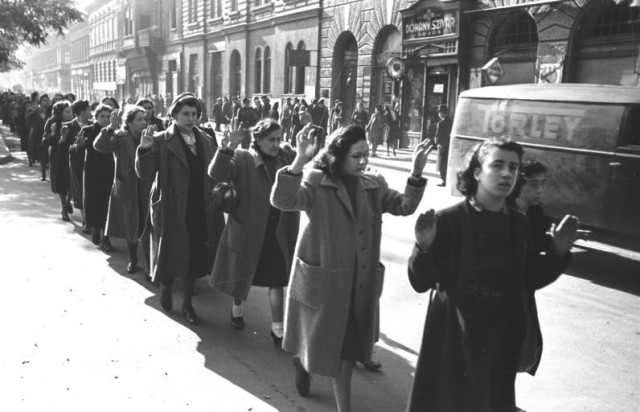
Fourteen survivors of the Holocaust sued the Hungarian government and its national train company, MAV, last month. The charge was that they had cooperated with the Nazi government to deport over 500,000 Hungarian Jews and had seized their property during World War II. The lawsuit is intended to make a fund to support Hungarian Holocaust survivors and their families. It could be worth billions of dollars if it is successful.
It is hard to imagine, though, how such a fund could repay the survivors for everything they lost.
Each survivor, has a different attitude to the issue of compensation. Nowhere is this clearer than the case of two Hungarian Jewish cousins, members of the de Jánosi’, who lost everything and nearly everyone they knew to the Nazis in World War II.
Now in their twilight years, one has chosen to leave the past behind and move forward while the other wants the property she says is hers. The property is that of the estate of the de Jánosi’ family in Hungary and especially the town of Pécs.
In 1880, Adolf Engel bought and fixed up a country estate formerly owned by Alfred of Montenuovo, a Hapsburg prince. He rebuilt the town of Jánosi and the town’s Catholic church. He built one of the largest coal mines in Hungary. He built a railroad to move the coal, houses for the miners, and a school, all of which benefted the nearby village of Pécs.
Emperor Franz-Joseph I of Austria-Hungary granted nobility to Engel and his heirs in recognition of his “economic virtues.” Because he was now nobility, he could add “de…” to his last name. Because Jánosi Castle (Jánosipuszta) was so important to him, he chose “de Jánosi.”
The Germans seized all of Engel de Jánosi’s property in 1944. The castle became a home for the elderly and then an orphanage, but is now abandoned. Everything of value has been stripped from it and stolen. All of the copper wiring has been pulled out. The bricks are shattered. It is a shell of its former self.
The mother of writer Margaret McMullen is Engel de Jánosi’s great-granddaughter. She was born in Vienna in 1929 and has never been to Jánosipuszta or even met her Hungarian relatives, writes McMullen in the Washington Post. She was raised Catholic after her father converted in the 1930’s. She grew up in Hofzeile, the sixth and final of Engel de Jánosi’s estates.
It was originally built for the Grand Duke Rudolf, the crown prince of the Austro-Hungarian Empire. McMullen’s mother fled with her family when the Nazis invaded Vienna and seized the Hofzeile. Her mother advised her to never look back, and she never did. She never saw that the Hofzeile again because during the war, it was destroyed probably by Allied bombs.
Her cousin, Anna Stein, spent summers at Jánosipustza. In 1944, the Nazis arrested Anna’s parents. The police chief had papers that said Zsidó, or “Jew,” and megöl, or “kill.” Since the chief knew her parents, he said that those papers would disappear if Anna and her family disappeared. They left that day. Nuns hid the children in the Hungarian countryside while the parents hid in farmhouses.
They survived the Nazi occupation and the Soviet occupation. In 1956, Anna left Hungary for Paris with her brother. Her parents moved to the U.S.
Nowadays, Jánosi Castle is run down. The town cannot afford to keep it up. The mines have been closed for decades. There are no jobs and not much chance of things changing in the near future.
Anna sees the town council of Pécs as simply thieves who stole her family’s property. She feels that as the rightful heir to the town, it should all belong to her. There had been a time when victims of the Nazis could claim compensation, but that time has passed. If relatives wish to reclaim their ancestors’ property, they have to be rich enough to buy it outright.
So what should Hungary do? It could imitate Germany and publicly apologize for its role in the Holocaust, which it has never fully acknowledged. Outside of Budapest, few Holocaust memorials have been erected.
McMullen’s mother, on the other hand, is not interested in reparations. She is 86 and not concerned about such things. She would rather the Syrian refugees find a welcoming home in Hungary. “What’s past is past,” she says. While Germany took in 1.1 million refugees last year, Hungary closed its borders. Maybe Hungary can’t repay what it has taken but, like Germany, they could try to and help those in danger today.
Images By Bundesarchiv, Bild 101I-680-8285A-08 / Faupel / CC-BY-SA 3.0, CC BY-SA 3.0 de, https://commons.wikimedia.org/w/index.php?curid=5477379